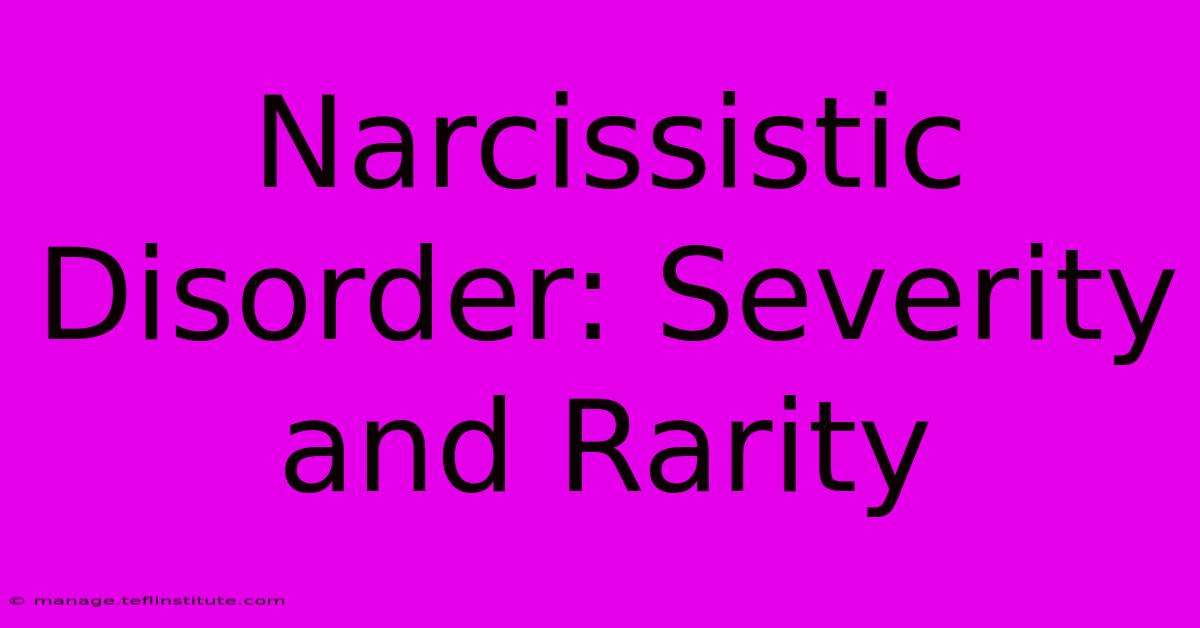Narcissistic Disorder: Severity And Rarity

Table of Contents
Narcissistic Disorder: Severity and Rarity
Narcissistic Personality Disorder (NPD) is a complex mental health condition characterized by an inflated sense of self-importance, a need for excessive admiration, and a lack of empathy. While it's often portrayed in popular culture as simply "being vain," NPD is a serious disorder that can significantly impact an individual's relationships, career, and overall well-being.
Severity of NPD:
NPD exists on a spectrum, with varying levels of severity. Some individuals may exhibit mild narcissistic traits that primarily affect their personal relationships, while others experience more severe symptoms that disrupt their entire life.
Here's a breakdown of severity:
- Mild: These individuals may have a high opinion of themselves and crave admiration, but their behavior doesn't significantly impact their daily lives. They might be seen as arrogant or self-centered, but they are generally capable of functioning in society and forming healthy relationships.
- Moderate: Individuals with moderate NPD experience more pronounced symptoms. Their need for admiration becomes more intense, and they often engage in manipulative behavior to get their needs met. Their relationships are frequently strained, and they may struggle to maintain employment or achieve their goals.
- Severe: Individuals with severe NPD exhibit significant impairment in their personal and professional lives. Their need for admiration is insatiable, leading to grandiose fantasies and a sense of entitlement. They often engage in reckless and exploitative behaviors, struggle with empathy, and are likely to experience instability in relationships and career.
Rarity of NPD:
NPD is relatively rare, affecting approximately 0.5-1% of the population. It's more common in men than women, and the disorder typically emerges during adolescence or early adulthood.
However, it's important to note that:
- Misdiagnosis: NPD is often misdiagnosed or overlooked due to the stigma associated with the disorder. Many individuals may be unaware they have NPD or are reluctant to seek treatment.
- Co-occurring Disorders: NPD frequently coexists with other mental health conditions such as anxiety, depression, and substance abuse, further complicating diagnosis and treatment.
- Subclinical Narcissism: A significant portion of the population may exhibit some narcissistic traits without meeting the criteria for a full diagnosis.
Impact of NPD:
The impact of NPD can be devastating for both the individual and those around them. Individuals with NPD often experience:
- Relationship problems: Their lack of empathy, need for admiration, and manipulative behavior can lead to strained relationships with family, friends, and romantic partners.
- Career difficulties: Their inflated sense of self-importance and difficulty with criticism can hinder their professional growth and lead to conflicts with colleagues and supervisors.
- Mental health issues: NPD is associated with increased risk of anxiety, depression, and substance abuse.
- Legal and financial issues: Their impulsive and reckless behaviors can lead to legal problems, financial instability, and even substance abuse.
Treatment and Management:
While NPD is often difficult to treat, therapy can help individuals manage their symptoms and improve their overall well-being.
Treatment options may include:
- Psychotherapy: Cognitive Behavioral Therapy (CBT) and Psychodynamic Therapy are commonly used to address underlying thought patterns and behaviors.
- Medication: Antidepressants and mood stabilizers may be prescribed to treat co-occurring conditions like depression and anxiety.
- Support Groups: Sharing experiences with others facing similar challenges can provide support and encouragement.
Conclusion:
Narcissistic Personality Disorder is a complex and often misunderstood condition. While its severity and rarity vary widely, it's essential to understand its impact on individuals and their relationships. Early identification and appropriate treatment can significantly improve the quality of life for those with NPD and those around them. If you or someone you know is struggling with NPD, seeking professional help is crucial.

Thank you for visiting our website wich cover about Narcissistic Disorder: Severity And Rarity . We hope the information provided has been useful to you. Feel free to contact us if you have any questions or need further assistance. See you next time and dont miss to bookmark.
Featured Posts
-
Luke Evans On His Partner We Can Solve Anything
Nov 12, 2024
-
Megan Fox Pregnant Fourth Child First With Mgk
Nov 12, 2024
-
New Pill Helps Smokers Quit Saves Lives
Nov 12, 2024
-
Saudi Princes Plea To Israel On Attacks
Nov 12, 2024
Latest Posts
-
England Beats Greece Carsley Impresses Tuchel
Nov 15, 2024
-
Venezuela Vs Brazil Penalty Drama
Nov 15, 2024
-
Brazil Wins Despite Vinicius Miss
Nov 15, 2024
-
2026 Qualifiers Brazil Edges Venezuela
Nov 15, 2024
-
Carsleys Performance Impresses Tuchel In England Win
Nov 15, 2024
-
Romo Leads Brazil Past Venezuela
Nov 15, 2024
